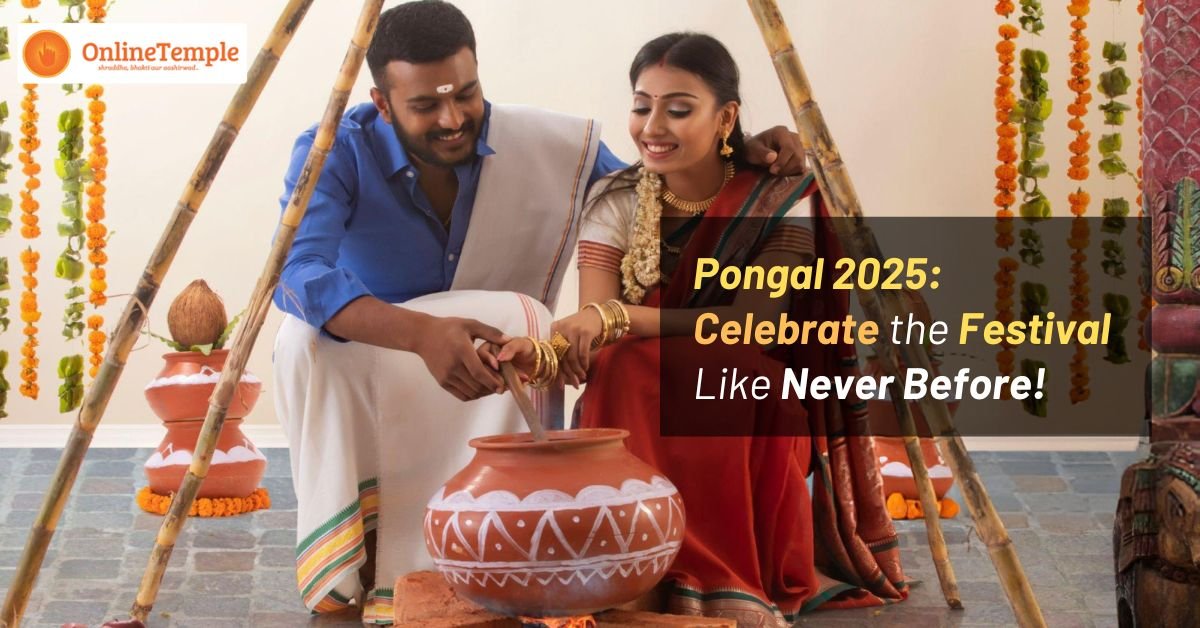With Online Temple, you will learn all about the newest Indian festivals that are coming up and more. This includes Pongal, a renowned Hindu festival celebrated popularly across South India. Since Pongal is a 4 – day Indian festival, the festivities begin on the 13th of January 2025. So, before you go book online pujas with us, here’s a look at everything you need to learn. Let’s celebrate this festival like never before!
Everything You Need to Know About the Joy, Traditions, and Celebrations of Pongal Festival
As this is a vibrant harvest festival, Pongal is loved all across India by many names. Although it is mainly enjoyed in Tamil Nadu, this festival is celebrated everywhere in the world. Here’s what you can learn about this popular Hindu festival with us.
Dates of Pongal in 2025
| Name of the Festival | Date | Day |
|---|---|---|
| Bhogi Festival | 13 January 2025 | Monday |
| Makar Sankranti | 14 January 2025 | Tuesday |
| Surya Pongal | 14 January 2025 | Tuesday |
| Mattu Pongal | 16 January 2025 | Thursday |
| Kaanum Pongal | 17 January 2025 | Friday |
Festival Names Across Indian States
| Name | Region |
|---|---|
| Makar Sankranti | Uttar Pradesh, Karnataka, Goa, Andhra Pradesh, Kerala, West Bengal, Maharashtra, Bihar, Telangana, Madhya Pradesh, Manipur, Odisha, Kerala |
| Uttarayana | Rajasthan, Gujarat |
| Maghi | Punjab, Haryana, Himachal Pradesh |
| Magh Bihu | Assam |
| Maghe Sankranti | Nepal |
Celebrating the Traditions and Rituals of Pongal Festival
Pongal is a 4 day festival celebrated with great enthusiasm in South India. The name “Pongal” means “to boil,” and it is a way to thank the Sun God for a good harvest. People boil rice in milk and offer it to the sun as a part of the celebration. This is a time of joy and gratitude for a bountiful harvest. So, if you want to celebrate it as well, get your puja samagri online from us now!
Bhogi Pongal
The 1st day of the festivities is called Bhogi Pongal. It is dedicated to Lord Indra, the God of rain. People clean their homes and burn all their old, useless items in a bonfire made of wood and cow dung. Homes are decorated with beautiful Kolams (patterns made with rice flour) and flowers. This marks the beginning of the festival with prayers for prosperity.
Surya Pongal
The 2nd day is Surya Pongal. This is when people join hands to prepare a special dish called Pongal, made from rice, lentils, milk, and jaggery. After it is made, the dish is offered to the Sun God to thank him for a successful harvest. The day starts with a morning bath, and people decorate their homes with Kolams to welcome the sun. It is also known as Thai Pongal or Makar Sankranti in some parts of India.
Mattu Pongal
Mattu Pongal is the 3rd day of the festivities. It is dedicated to worshipping cows, which are essential to farming. According to legend, Lord Shiva sent his bull, Basava, to teach people good habits. On this day, cows and oxen are bathed, decorated with flowers, and offered food. Bull fights and other festivities are also a part of this celebration.
Kaanum Pongal
The 4th and final day, Kaanum Pongal, is a day where families enjoy bonding with each other. Leftover food is placed on a turmeric leaf, along with sugarcane and betel leaves. Women pray for the well being and prosperity of their brothers. And with this, the 4 day celebration finally comes to an end. On this day, people are filled with love, prayers, and joy for the family.
Conclusion
Pongal is a vibrant festival filled with food, prayers, and traditions. If you’re in South India in January, it’s a celebration you won’t want to miss! Join in the festivities if you are present. Or if you can’t, get the best group of professional purohits & pandits to celebrate this sacred harvest festival and enjoy the blessings.
Also Read: Lohri 2025: Date, Traditions, And The Festival’s Rich Cultural Meaning

